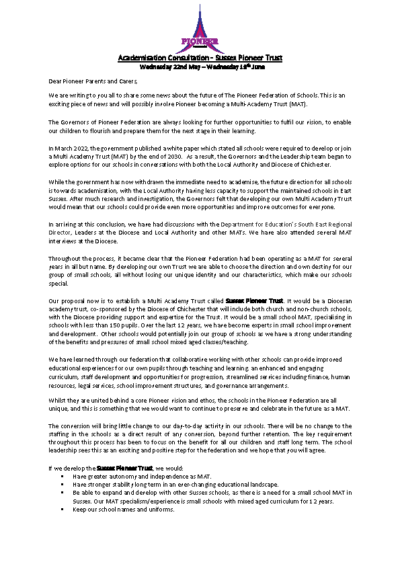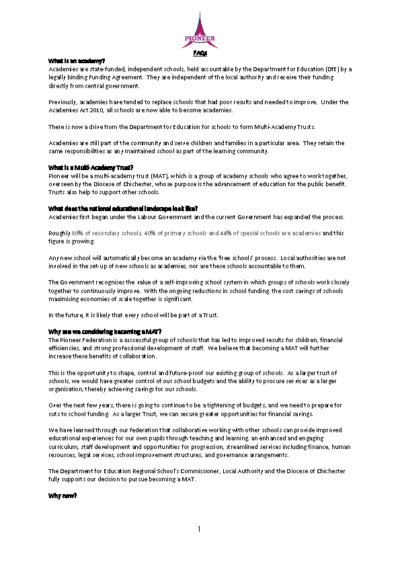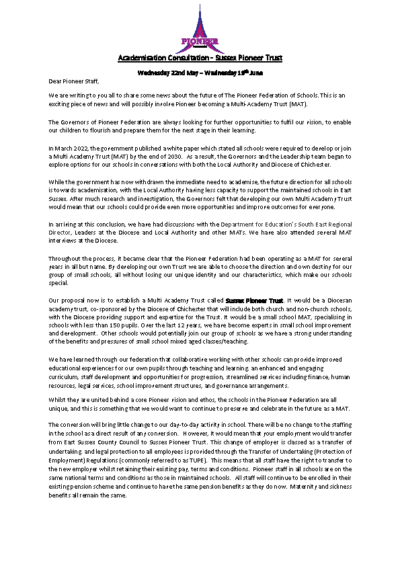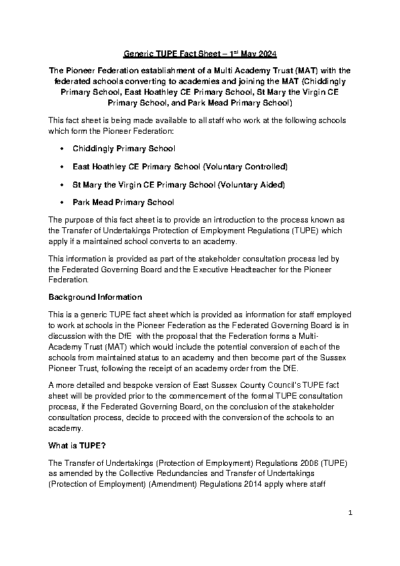Answers to Consultation Questions Raised
Questions and responses will be added here as and when they become available. Click on any question below to reveal the answer underneath.
As explained with the consultation letter, we are developing our own standalone Trust and we will not join a larger MAT. We are proposing this to formalise the federation so that it has an assured future as an entity and all that that brings for the schools and families.
‘The case for a fully trust-led system’ March 2022 – DfE Research paper- ‘School performance’ page 14 ‘Multi academy trusts have largely taken on the challenge of underperformance. Sponsored academies generally replaced under-performing local authority schools, many with a history of low attainment, and they are usually supported within MATs. MATs therefore have many more schools which have historically faced challenges. As underperforming LA maintained schools have joined MATs, remaining LA maintained schools are more likely to be judged Good or Outstanding by Ofsted. Many schools converted into single academy trusts as higher performing Good and Outstanding schools and have largely remained so.’
‘The case for a fully trust-led system’, published alongside the March 2022 white paper, the government argued that MATs have a strong record in improving standards in underperforming schools.
Data on Ofsted ratings does not show that schools in MATs have better ratings than other types of school, according to information published in the same paper. However, the government emphasised that many schools joined MATs because they were underperforming; therefore they started from a lower base. The government highlighted that “more than seven out of 10 sponsored academies were now rated good or outstanding compared to about one in 10 of the local authority-maintained schools they replaced”.
Briefing paper on the House of Lords library – Sept 2023- Underperforming schools have often joined sponsored MATs. Maintained schools judged by Ofsted to be inadequate are required to become academies under the Education and Adoption Act 2016. If a school is judged to be ‘coasting’ (not making necessary improvements) then the relevant regional director can intervene to support the school. The government’s policy is that “there will be a presumption in favour of issuing the maintained school with an academy order so that it may join a strong multi-academy trust unless exceptional circumstances apply”.
On academic results the picture is mixed, according to figures in the same government paper. The percentage of pupils achieving the expected standard in reading, writing and maths was, on the whole, slightly higher in maintained schools than in MATs. For example, the median proportion of students reaching the expected standard was 67% for maintained schools and 65% for MATs. However, MATs had a greater variation in performance. The higher performing MATs performed better than the better performing maintained schools, and the lower performing MATs performed worse than the worst-performing maintained schools.
Ofsted/LA grading and pupil outcomes have increased across all Pioneer schools since working in partnership and we would expect this to continue to be the case if we created Sussex Pioneer Trust. The same structures would exist in the Trust, as they are in the partnership but on a larger scale.
In March 2022 the government published the ‘Opportunity for all’ education white paper. The government argued that MATs were better than maintained schools because they could “share good practice, support their schools to improve, and provide opportunities for staff”. It said that larger MATs, of 10 or more schools, could also achieve economies of scale, enabling them to be “financially stable, maximise the impact of a well-supported workforce and drive school improvement”. In addition, it argued that “MATs can pool resource and expertise to benefit children with SEND [special educational needs or disability]”.
The National Foundation for Educational Research (NFER) also criticised the government’s claim that large MATs can manage their finances more effectively than other types of structure. NFER said that the government’s argument was “difficult to evidence” because families of schools are able to pool their finances, which means it is “difficult to observe the real circumstances of an individual MAT school and compare that with single trusts or maintained schools”. Therefore, it argued, the government is not “comparing like with like”.
As a federation of 4 schools we have found financial savings and have a deficit free budget. We are already operating as a MAT in terms of pooling of resources etc. This includes shared expertise, shared training, shared roles and reduction in multiple training & bulk purchasing. We would expect that these advantages increasing as we develop further. We would still be entitled to the capital grant to maintain our school premises and as a MAT can apply to DfE for larger projects. We have not experienced financial support from the LA i.e. redundancies or support with shortfalls etc. when we have faced these situations in the past.
The Pioneer Governing Body have researched other larger MATs over several years. We are developing our own standalone Trust and we will not joining a larger MAT.
There will be parents from our schools, represented within the Trustees of the Trust. This will be written into the Trust articles.
The trust will only employ qualified teachers as class teachers. This will be written into the Trust articles.
As a LA federation, we buy into all the external services we receive- including SEND support, school improvement services & safeguarding and health/safety support. The LA does not provide these for free. There are no plans to remove any of these services from the school. We would still have these services but would have more flexibility about the brokering of where these services come from and can therefore have more control over the quality of these services for the schools.
The TUPE agreement states that all staff working in your schools will continue to be paid in line with national pay scales. All terms and conditions will remain.
MAT leaders are and will be paid in line with national pay scales.
Reply from Janet Bowen (Lead HR Consultant): ‘The TUPE consultation process with staff and unions provides clear information on the statutory rights of staff to retain their existing terms and conditions of employment at the point of transfer to the new employer. There is also information on the process to be followed if a Trust wishes to review terms and conditions of employment in the future, or to make changes for economic, social, technical or organisational reasons (ETO). I am not aware of Trusts in East Sussex which have implemented detrimental change to staff terms and conditions of employment post transfer. Certainly, Trusts which purchase the ESCC HR Advisory Service and Payroll follow the East Sussex Pay Policy for teachers/school leaders as well as local pay arrangements (Single Status) for support staff. Staff should be reassured by this process if the TUPE consultation launches’.
SPT will be purchasing the ESCC HR Advisory Service and will have a separate policy for the MAT around pay and contract that follows follow the East Sussex Pay Policy for teachers/school leaders as well as local pay arrangements (Single Status) for support staff.
All the information we have had from the DfE, Local Authority & Diocese is that the MAT agenda will be continuing even if there we have a change of Government. We are pursuing a standalone MAT for all the reason set out in the consultation PowerPoint and letters.
‘The Governors felt that developing our own Multi Academy Trust would mean that our schools could provide even more opportunities and improve outcomes for everyone’. Since the Pioneer schools have worked in collaboration pupil outcomes have increased across our schools. We work closely with The Compass MAT (Greenwich based Trust) and TCAT (Sussex Based Trust) and the educational outcomes for pupils at primary in these MATs are better for their schools since they have worked in collaboration/MAT.
We explained the discrepancy in pupil outcomes in earlier questions above – when comparing MAT data to LA data.
This DfE study from 2019 was sent to us by the Regional Schools Commissioner and concluded that- ‘Although these results cannot prove that changes in performance of sponsored academies are fully caused by academisation (and there is scope for further improvements to our analytical approach), the findings in this report do demonstrate that, overall, pupil outcomes in sponsored academies have typically improved since their formation in comparison with sets of similar schools.’ An analysis of the performance of sponsored academies (publishing.service.gov.uk)
The same implications would be in place for underperforming LA, as they would be for MAT schools i.e. that they could be directed towards another academy.
A re-brokerage is the term the DfE use where one academy trust is asked by the Regional Director (RD) to transfer one, some or all of its academies to another academy trust. Typically, the underlying reason for the re-brokerage will be as a result of concerns about performance at one or more of the trust's academies.
What happens to under performing LA schools? The Secretary of State for Education will issue an academy order to a maintained school judged inadequate and placed in a category of concern. The school will then become a sponsored academy.
The MAT would have Members, Trustees and Local Governing Bodies. The Governors will have a period 4 years term of office and would need to be re-elected. The MAT Governors will be held to account by the MAT Members and the Trustees and Members/Trustees are held to account by Ofsted, DfE and the Regional Schools Commissioner. Budgets and accounts would have regular independent auditing and the MAT would have a qualified Chief Finance Officers (CFOs) overseeing the MAT budget.
We don’t intend to change these aspects of school management and are not planning any other significant changes in the day to day running of our schools.
There was an initial concern that we might not receive the annual Capital Grant for the developed of each school premises. However it has been confirmed that the MAT will receive this funding. We would need to apply for larger grants from DfE rather than the LA in the future.
The plan in the future would be that Head of School would become Headteachers in their schools and would no longer have a teaching commitment. This would enable them to have more time to lead and manage their schools and the CEO/EXHT would still be there to work alongside them. We would also plan to develop Senior HTs who would work alongside the EXHT/CEO in supporting each cluster of schools.
When will a new academy be inspected? The first inspection of all new schools, including academies, and academy converters will usually take place within three years of opening. In most instances, OFSTED will not select new schools for a first inspection until they are in their third year of operation. Ofsted may conduct a section 8 monitoring inspection of any new school at any time, including within three years of opening, where information we hold or receive causes sufficient concern.
This is a useful article for the question: https://files.schudio.com/parallel-learning-trust/files/documents/join-us/faq-academies-and-ofsted-inspections.pdf




